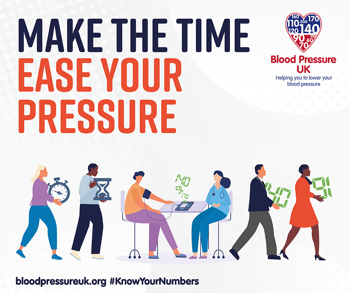Know Your Numbers! Week 2023
Monday, 4 September 2023

Do you know your numbers? Get a blood pressure check this Know Your Numbers! Week and help prevent a heart attack or stroke.
The North West’s lead GP is urging people to get their blood pressure checked to help prevent killer conditions such as heart attacks and strokes – and save lives.
Dr Paula Cowan, Regional Medical Director for Primary Care for NHS England – North West, has spoken out for national Know Your Numbers! Week (4-10 September), to encourage people of all ages to regularly monitor their blood pressure and get high blood pressure under control.
The North West has the highest number of people with GP recorded hypertension in England, but it’s thought many more – up a further 520,000 people in the region – could have high blood pressure without realising it.
Know Your Numbers! Week, an annual initiative by Blood Pressure UK, aims to raise awareness of the importance of managing blood pressure and encourage those at risk to get their blood pressure checked regularly.
High blood pressure (hypertension) is a major risk factor for cardiovascular disease (CVD) increasing the risk of heart attacks, stroke and diabetes, and is a leading cause of death and disability in the North West. It’s estimated that improving detection and treatment of hypertension in the North West could prevent 910 heart attacks and 1,358 strokes over a three-year period.
Dr Cowan said:
“The early detection of high blood pressure gives people a better chance of preventing them from have a stroke or heart attack, and potentially developing long term health problems. Knowing your numbers could help you manage potential risks and save your life.
“The only way to find out if your blood pressure is high is to have your blood pressure tested. High blood pressure rarely has noticeable symptoms, but if untreated, it increases your risk of heart attack and stroke.
“Checking your blood pressure is easy to do. If you have a blood pressure machine at home you can do it yourself. Just take readings morning and evening for a week, work out the average, and send it to your GP practice Alternatively, you get a free blood pressure check, at your pharmacy, GP surgery, at many workplaces, or as part of your NHS Health Check.”
It’s recommended that healthy adults 40 to 74 years of age have their blood pressure tested at least every five years. People who are near the threshold for high blood pressure may be asked to monitor it more often.
GPs and community pharmacists across the North West are leading the fight against common conditions that cause cardiovascular disease (CVD) and stroke, by encouraging self-awareness and lifestyle changes. This includes encouraging communities to exercise, eat well, drink within safe limits and stop smoking.
Community pharmacists are trained to carry out blood pressure checks, analyse the results and refer patients with high blood pressure to their GP for further checks and advice on lifestyle changes.
Karen O’Brien, Chief Pharmacist for NHS England – North West, said:
“The blood pressure check is simple and quick to do, and you get your results there and then.
“Knowing your numbers could prevent you having a heart attack, stroke or detect other diseases. Don’t wait until it’s too late, pop in and speak to your community pharmacist.”
6 top tips to reduce your blood pressure (BHF):
- Regular physical activity – Try to do some moderate-intensity activity every day and build up to at least 150 minutes per week, in bouts of 10 minutes or more.
- Keep to a healthy weight – For some people, losing weight is all they need to do to get their blood pressure down to a normal level.
- Eat a healthy balanced diet – Use the Eatwell plate to guide the proportions you include from each food group. In particular, include a variety of fruit and vegetables.
- Cut down on salt – Don’t cook with salt or add any to your food at the table, and cut down on processed foods, which contain a lot of salt.
- Don’t drink too much – If you drink alcohol, stick within the recommended limits. No more than 3–4 units a day for men and no more than 2–3 for women.
- Take medications as prescribed – Most people will need to take more than one type of medicine to control their blood pressure. Don’t stop taking your medication without consulting with your GP first.